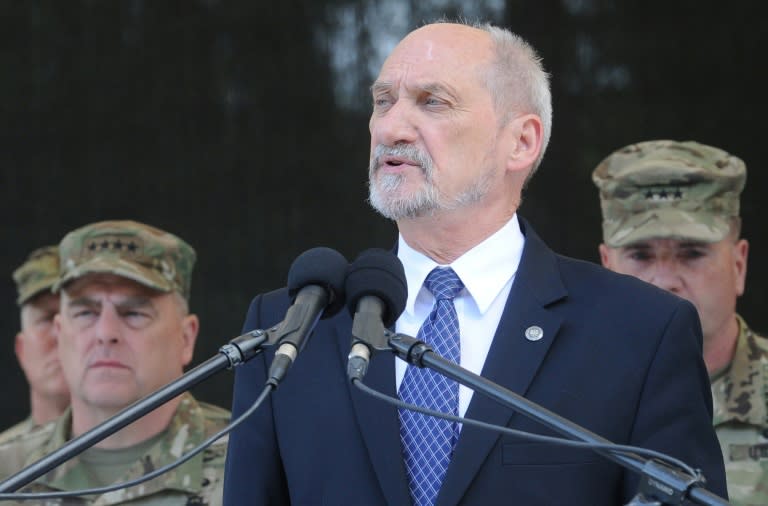As NATO moves in troops, reforms hit Poland's military hard
As NATO pours troops into Poland to beef up its eastern flank, key Polish generals at odds with the defence minister over a series of controversial reforms are quitting or being ousted in droves. Experts warn the exodus is leaving Poland short of experienced commanders as NATO sets up battalions there and in the Baltic states as tripwires against Russian adventurism in the region, formerly under Moscow's control and spooked by its actions in Ukraine. President Andrzej Duda and NATO Supreme Allied Commander US General Curtis Scaparrotti launch a US-led NATO multinational battle group in the northeastern Polish town of Orzysz on Thursday. Statistics show that around 90 percent of Poland's top military brass have either been replaced or left of their own accord amid an overhaul launched by Defence Minister Antoni Macierewicz after his rightwing Law and Justice (PiS) party took power in October 2015. The figure translates to 34 generals and 484 colonels in a force of 106,000 soldiers, up from 96,000 in 2015. Notable departures include former chief of staff General Mieczyslaw Gocul and top strategic commander General Miroslaw Rozanski. "Senior military figures are leaving because there are decisions that have been forced upon them about their subordinates without their consent," a Warsaw-based senior political analyst told AFP on condition of anonymity. "Objectively there aren't enough generals in the Polish army," he added. "It will take a very long time to replace some of the people who have left, especially regarding their experience working with allies" since Poland joined NATO in 1999, the analyst said. Macierewicz maintains he wants to stamp out all traces of the communist era by blocking promotions of servicemen who joined before the fall of the Iron Curtain in 1989, especially those who attended military schools in the Soviet Union. - 'Good change' policy - Defence ministry spokeswoman Anna Peziol-Wojtowicz told AFP that "despite personnel changes, continuity of command in all military components is being maintained". But commentators, opposition parties and other critics have deep misgivings. Many see the overhaul as part of the PiS's so-called "good change" policy of installing loyalists in key state posts. The government has replaced directors in a slew of state-controlled enterprises and public institutions like television and radio. It has also pushed through personnel changes that critics insist undermine the independence of the Constitutional Court. Jan Techau, director of the Richard C. Holbrooke Forum at the American Academy in Berlin, calls what he terms the PiS's "politicisation" of the military as "a train wreck in the making." "What is worrisome is that the military now seems to be the next part of the Polish state that the government has sought out for ideologisation," Techau told AFP. "Politicising the military is never a good idea, as it undermines professionalism and also creates very unhealthy frontlines in society." Techau however said he did "not think that there are any concerns about the Polish armed forces readiness, yet". While other observers contacted by AFP agree that it is still too early to judge whether the changes in Poland's top brass affect its ability to cooperate effectively within NATO, they have little doubt that its allies are wary of Macierewicz himself. - 'Terrible reputation' - "There are concerns among allies about the predictability of the minister," the Warsaw-based analyst told AFP. "Macierewicz has a terrible reputation. He has a hard time meeting his counterparts." The 68-year-old former anti-communist dissident has raised eyebrows on both sides of the Atlantic with a string of comments and actions. He has been a leading proponent of the theory that far from being an accident, the deadly 2010 crash of a Polish presidential jet in Smolensk, western Russia, was caused by an explosion that was part of a Polish-Russian conspiracy. He has also accused former Polish premier and current EU President Donald Tusk of "diplomatic treason" over an earlier probe into the crash that concluded it was an accident. Last year Macierewicz launched a new paramilitary territorial defence force intended to recruit up to 53,000 civilian volunteers by 2019. Slated to cost 800 million euros ($862 million) critics warn it will syphon off funds desperately needed by the regular military for modernisation. Warsaw's March move to reduce its role in the Eurocorps force, an intergovernmental European military body tasked with leading and coordinating multinational operations, could also not have gone ahead without his agreement. Andrzej Zybertowicz, an advisor to Duda, told reporters that the force, seen by Warsaw as being focused primarily on defending Europe's "southern flank, does not interest us".



